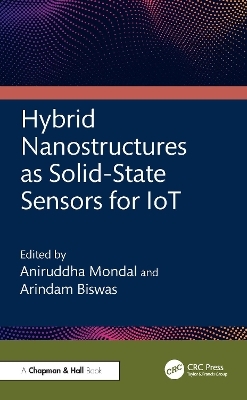
Hybrid Nanostructures as Solid-State Sensors for IoT
Chapman & Hall/CRC (Verlag)
978-1-032-71403-5 (ISBN)
- Lieferbar (Termin unbekannt)
- Versandkostenfrei innerhalb Deutschlands
- Auch auf Rechnung
- Verfügbarkeit in der Filiale vor Ort prüfen
- Artikel merken
• Offers in-depth discussion on Hybrid Nanostructures as solid-state sensors
• Elaborates upon the fabrication of gas sensors using metal oxide semiconductor nanostructures
• Studies biosensors based on metal oxide semiconductor nanostructures
• Discusses the suitability of various Hybrid Sensors in solving the problems of the Internet of Things (IoT)
• Provides extensive support for the development of Hybrid Nanostructures as solid-state sensors
The book is meant for researchers and scholars of Computer Science and associated disciplines. It also serves as a valuable reference for graduate students, researchers, seeking to deepen their knowledge and engage with the latest advancements in these Hybrid Nanostructures as solid-state sensors.
Aniruddha Mondal has been an Associate Professor in the Department of Physics at the National Institute of Technology Durgapur since 2014. He earned his PhD in Electronic Science from Calcutta University in 2008. He then served as Institute Postdoctoral Fellow in the Department of Electrical Engineering at the Indian Institute of Technology Kanpur (2008・ 2009). Then, he was appointed as Research Professor/ Assistant Professor at Dongguk University in Seoul, Republic of Korea (2009・ 2010), where he worked at the Millimeter Wave Innovation Technology Research Centre. He also worked as Assistant Professor at the National Institute of Technology Agartala, Tripura, in the Department of Electronics and Communication Engineering for 4.5 years (2010・ 2014). His research interests include the fabrication of III- V, IIIN, perovskite, and thermochromic thin films and nanostructure semiconductor materials, 1D metal oxide semiconductor nanostructure using glancing angle deposition technique, and fabrication of UV-Vis detector, infrared detector, plasmonic detector, and hybrid semiconductor detectors. He has published more than 88 papers in highly reputed Science Citation Index (SCI) journals, 58 conference papers, and holds 3 patents. He has guided 13 PhD students, and 3 PhD students are currently working under his supervision along with one Postdoctoral Fellow/ RA. He has completed seven projects as PI, funded by the Department of Science and Technology (Science and Engineering Research Board, India) [DST (SERB)], Board of Research in Nuclear Sciences (Department of Atomic Energy, India) [BRNS (DAE)], All- India Council for Technical Education (AICTE), and Indian Space Research Organization (ISRO). Currently, two projects funded by DST (SERB) and ISRO are running under his supervision. Arindam Biswas is presently an Associate Professor in the School of Mines and Metallurgy at Kazi Nazrul University, West Bengal, India. He also serves as adjunct faculty at Taylor’s University, Malaysia. He earned an MTech degree in Radio Physics and Electronics from the University of Calcutta, India, in 2010 and completed his PhD at NIT Durgapur in 2013. He has worked as a postdoctoral researcher at Pusan National University, South Korea, with the prestigious BK21PLUS Fellowship, Republic of Korea. Biswas has received the DST- JSPS Invitation Fellowship at RIE, Japan, and the DST- ASEAN Invitation Fellowship at Duy Tan University, Vietnam, and Taylor’s University, Malaysia. He has also served as Visiting Fellow in the Department of Electrical and Computer Engineering at the National University of Singapore. He has worked as Specially Appointed Associate Professor (Visiting) at the Research Institute of Electronics, Shizuoka University, Japan. He has been selected for IE (I) Young Engineer Award for 2019・ 20, KNU Best Researcher Award (Engineering and Technology) for 2021, and KNU Best Faculty Award for 2022 (Faculty of Science). He has authored 8 books/ monographs and edited 24 volumes and 10 book chapters with international repute. Biswas has received research grants from various funding agencies, including SERB, DST- ASEAN, DST- JSPS, UGC, and industrial consultancy from Eastern Coalfield Limited (ECL). He has also received an international research grant from the Centre of Biomedical Engineering, Tokyo Medical and Dental University, in association with RIE, Shizuoka University, Japan, for four consecutive years from 2019 to 2023. Biswas has guided six PhD students, with an additional three students having submitted their theses for PhD. He is a lifetime member of the Institute of Engineers (India), the Mining, Geological & Metallurgical Institute of India (MGMI), Regular Fellow of Optical Society of India, and a member of the Institute of Electrical and Electronics Engineers (IEEE).
1: Introduction 2 : Preparation of metal Oxide Semiconductor Nanostructure and their structural properties 3 : Polymer Semiconductors and FET sensors 4 : Fabrication Of Gas Sensor Using Metal Oxide Semiconductor Nanostructures 5 : Study Of Biosensors Based On Metal Oxide Semiconductor Nanostructures 6 : Biosensor Overview And Its Advances For Cancer Detection 7: Recent Progress in Nanomaterials-based IoT-Enabled Sensor
| Erscheinungsdatum | 21.11.2024 |
|---|---|
| Zusatzinfo | 10 Tables, black and white; 43 Line drawings, black and white; 6 Halftones, black and white; 49 Illustrations, black and white |
| Sprache | englisch |
| Maße | 156 x 234 mm |
| Themenwelt | Mathematik / Informatik ► Informatik ► Theorie / Studium |
| Mathematik / Informatik ► Informatik ► Web / Internet | |
| Technik ► Umwelttechnik / Biotechnologie | |
| ISBN-10 | 1-032-71403-4 / 1032714034 |
| ISBN-13 | 978-1-032-71403-5 / 9781032714035 |
| Zustand | Neuware |
| Haben Sie eine Frage zum Produkt? |
aus dem Bereich


